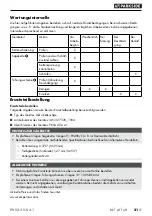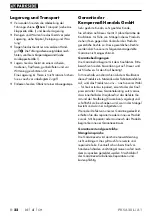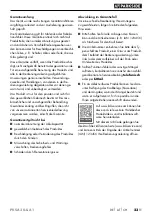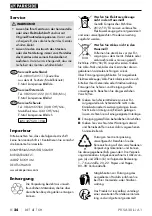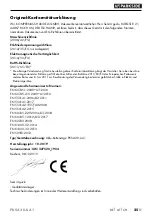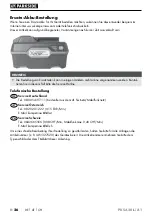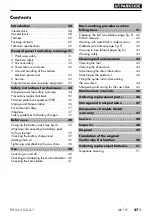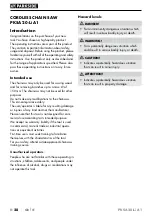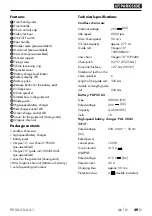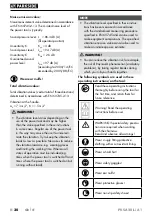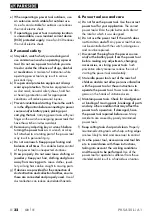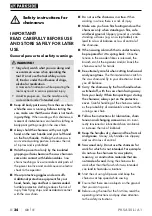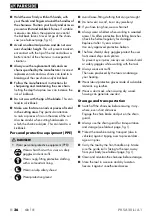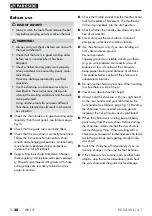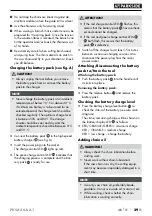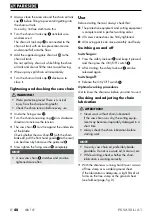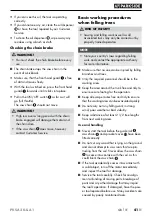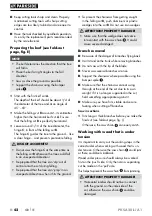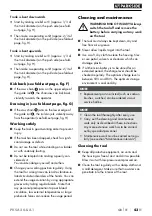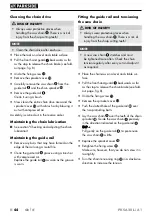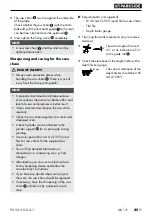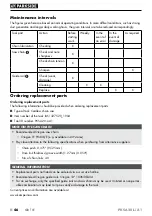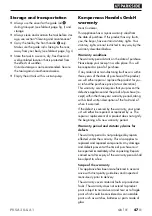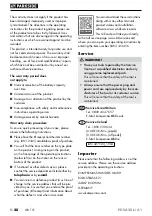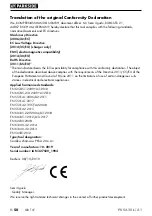
PKSA 20-Li A1
GB
│
IE
│
35
■
■
The warning and safety signs on the tool pro-
vide important information for safe operation.
■
In addition to the notices in these operating
instructions, all general safety and accident pre-
vention legislation must also be complied with.
■
Keep plastic wrapping away from children.
There is a risk of suffocation!
■
Insufficiently informed operators can be a
danger to other people and themselves due to
improper use. The operator is responsible for
third parties.
■
Be very careful when handling the tool. Use
common sense when working and play close
attention to what you are doing.
■
Do not work for longer than 10 minutes in one
session. We recommend taking a break of
10–20 minutes between working sessions.
■
Lend the tool only to users who have experi-
ence with the tool. Hand over the operating
instructions at the same time.
■
Some cutting tasks require special training and
particular skills. If in doubt, please consult an
expert.
■
First-time users must seek training to familiarise
themselves with the characteristics of the tool.
For your safety, attend a state-approved chain-
saw training course.
■
When not in use, the tool must be secured to
ensure that it is not a risk to anyone else.
Secure against unauthorised access.
■
The user of the tool is responsible for all acci-
dents and risks that cause injury or damage to
other people's property.
■
Children, adolescents and people with reduced
physical, sensory or mental capabilities must
not use the chainsaw. The only exception to this
are young people over the age of 16 who are
being trained by a specialist.
■
Note that improper maintenance, the use of
non-approved spare parts, or the removal or
modification of the safety equipment can lead
to damage to the tool and severe injuries to the
operator.
Precautions against kickback
WARNING! KICKBACK!
►
Be aware of the danger of kickback when
working with the tool. There is a risk of personal
injury. You can avoid kickbacks by being care-
ful and using the correct sawing technique.
■
Contact with the tip of the rail can, in some
cases, lead to an unexpected rearwards reac-
tion resulting in the guide rail flying upwards
towards the operator (see fig. A).
Fig. A
■
Kickbacks can occur if the tip of the guide rail
touches an object or if the wood bends and the
saw chain gets caught in the cut.
■
If the saw chain jams in the upper edge of the
guide rail, the chainsaw can kick back violently
towards the operator (see fold-out page, fig. F).
■
If the saw chain jams in the lower edge of the
guide rail, the chainsaw can jerk violently away
from the operator (see fold-out page, fig. G).
■
Be extremely careful when reapplying the chain
of the chainsaw to a cut you have already
started.
■
Do not saw any branches or pieces of wood
that can move their position during sawing or in
which the cut could close during sawing.
■
Any such reaction can lead to you losing control
over the saw and possibly injuring yourself. Do
not rely solely on the chainsaw's built-in safety
devices. As the user of a chainsaw, you can
take a number of measures to avoid accidents
and injury. A kickback is caused by incorrect
use or misuse. It can be avoided by taking
suitable precautions (as given below):
Bild 1
Summary of Contents for 327520 1904
Page 3: ... 375 9 525mm 05 1 27mm A ...
Page 4: ...B C D 45 60 1 4 3 4 A B C D E F G ...
Page 5: ...1 2 1 2 H I C B A J ...
Page 58: ...PKSA 20 Li A1 52 GB IE ...
Page 140: ...PKSA 20 Li A1 134 PL ...
Page 166: ...PKSA 20 Li A1 160 CZ ...

